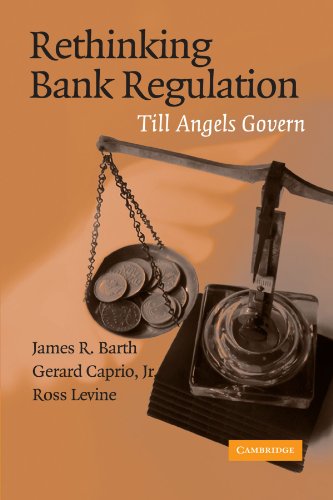Books by Gerard Caprio
Guardians of Finance: Making Regulators Work for Us (MIT Press)
Author(s): James R. Barth, Gerard Caprio Jr., Ross Levine
Publication date: 2014-08-29
ISBN: 0262526840, ISBN-13: 9780262526845
The recent financial crisis was an accident, a "perfect storm" fueled by an unforeseeable confluence of events that unfortunately combined to bring down the global financial systems. Or at least this is the story told and retold by a chorus of luminaries that includes Timothy Geithner, Henry Paulson, Robert Rubin, Ben Bernanke, and Alan Greenspan.
In Guardians of Finance, economists James Barth, Gerard Caprio, and Ross Levine argue that the financial meltdown of 2007 to 2009 was no accident; it was negligent homicide. They show that senior regulatory officials around the world knew or should have known that their policies were destabilizing the global financial system and yet chose not to act until the crisis had fully emerged.
Barth, Caprio, and Levine propose a reform to counter this systemic failure: the establishment of a "Sentinel" to provide an informed, expert, and independent assessment of financial regulation. Its sole power would be to demand information and to evaluate it from the perspective of the public--rather than that of the financial industry, the regulators, or politicians.
Handbook of Key Global Financial Markets, Institutions, and Infrastructure
Author(s): Gerard Caprio
Publication date: 2012-12-11
ISBN: 0123978734, ISBN-13: 9780123978738
- Substantial articles by top scholars sets this volume apart from other information sources
- Diverse international perspectives result in new opportunities for analysis and research
- Rapidly developing subjects¬ will interest readers well into the future
Handbook of Safeguarding Global Financial Stability: Political, Social, Cultural, and Economic Theories and Models
Author(s): Gerard Caprio
Publication date: 2012-12-11
ISBN: 0123978750, ISBN-13: 9780123978752
Political and social forces exert pressure on our globalized economy in many forms, from formal and informal policies to¬ financial theories and technical models. Our efforts to¬ shape and direct these forces to preserve financial stability reveal much about the ways we perceive the financial economy.¬ The Handbook of Safeguarding Global Financial Stability examines our political economy, particularly the ways in which these forces inhabit our¬ institutions, strategies, and tactics. As economies expand and contract, these forces also determine¬ the ways we supervise and regulate. This¬ high-level examination of the global political economy¬ includes articles about specific countries, crises, and international systems as well as broad articles about major concepts and trends..
- Substantial articles by top scholars sets this volume apart from other information sources
- Diverse international perspectives result in new opportunities for analysis and research
- Rapidly developing subjects¬ will interest readers well into the future
The Evidence and Impact of Financial Globalization
Author(s): Gerard Caprio
Publication date: 2012-12-11
ISBN: 0123978742, ISBN-13: 9780123978745
The sharp realities of financial globalization become clear during crises, when winners and losers emerge. Crises usher in short- and long-term changes to the status quo, and everyone agrees that learning from crises is a top priority.¬ The Evidence and Impact of Financial Globalization devotes separate articles to specific crises, the conditions that cause them, and the longstanding arrangements devised to address them. While other books and journal articles treat these subjects in isolation, this volume presents a wide-ranging, consistent, yet varied specificity. Substantial, authoritative, and useful, these articles provide material unavailable elsewhere.
- Substantial articles by top scholars sets this volume apart from other information sources
- Rapidly developing subjects will interest readers well into the future
- Reader demand and lack of competitors underline the high value of these reference works
Rethinking Bank Regulation: Till Angels Govern
Author(s): James R. Barth, Gerard Caprio Jr, Ross Levine
Publication date: 2008-05-12
ISBN: 052170930X, ISBN-13: 9780521709309
Reforming Financial Systems: Historical Implications for Policy
Author(s): Gerard Caprio Jr. Jr, Dimitri Vittas
Publication date: 2007-02-12
ISBN: 0521032814, ISBN-13: 9780521032810
Financial Liberalization: How Far, How Fast?
Author(s): Gerard Caprio, Patrick Honohan, Joseph E. Stiglitz
Publication date: 2006-11-23
ISBN: 0521030994, ISBN-13: 9780521030991
Financial Crises: Lessons from the Past, Preparation for the Future (World Bank/IMF/Brookings Emerging Markets)
Author(s): Gerard Caprio Jr., James A. Hanson, Robert E Litan
Publication date: 2005-12-06
ISBN: 0815712898, ISBN-13: 9780815712893
Throughout the 1990s, numerous financial crises rocked the world financial sector. The Asian bubble burst, for example; Argentina and Brazil suffered currency crises; and the post-Soviet economy bottomed out in Russia. In Financial Crises, a distinguished group of economists and policy analysts examine and draw lessons from attempts to recover from past crises. They also consider some potential hazards facing the world economy in the 21st century and discuss ways to avoid them and minimize the severity of any future downturn. This important new volume emerges from the seventh annual conference on emerging markets finance, cosponsored and organized by the World Bank and the Brookings Institution. In the book, noted experts address the following questions: How effective were post-crisis policies in Latin America, Eastern Europe, and East and Central Asia? Where do international financial markets stand ten years after the worldwide debt crisis? How can the provision of financial services resume vigorously, yet safely? What are the viable policy options for reducing systemic financial vulnerability? What will the next emerging-market financial crisis look like? Will lessons learned from past experiences help to avoid future disasters? How can nations reform their pension systems to deal with retirement challenges in the 21st century?
Financial Reform: Theory and Experience
Author(s): Gerard Caprio Jr, Izak Atiyas, James A. Hanson
Publication date: 1996-08-28
ISBN: 0521574242, ISBN-13: 9780521574242
Finance for Growth: Policy Choices in a Volatile World (World Bank Policy Research Report)
Author(s): World Bank
Publication date: 0000-00-00
ISBN: 0195216059, ISBN-13: 9780195216059
The book focuses on making finance effective in delivering growth, preventing and minimizing crises, on government failure in finance, and on harnessing the potential of a technology-driven world of finance without frontiers.
A copublication of the World Bank and Oxford University Press.
Williams College : Economics
Most popular books
Link to this page using the following URL: https://www.facultybookshelf.org/author/gerard_caprio









